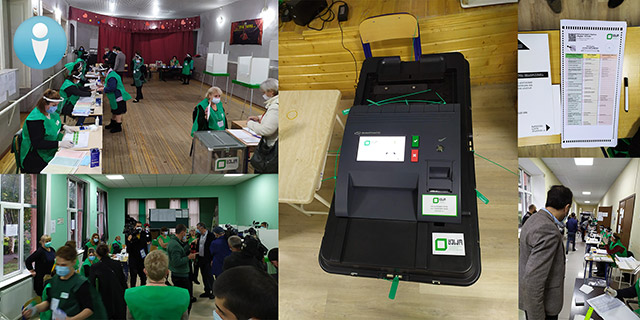The Union of Informed Citizens carried out an observation mission in local elections in Georgia on October 2, 2021 consisting of two mobile groups. The aim of the mission was to study the differences between the electoral legislation in Georgia and its implementation during Election Day, as well as to observe the pilot software of electronic ballot counting devices being tested in one polling station in Tbilisi.
The mission did not observe the election campaign, the media and political environment and did not seek to find out the violations of the electoral legislation. The mission was coordinated by the organization’s program coordinator Daniel Ioannisyan.
During the Election Day, the mobile groups visited 25 polling stations in Mtskheta-Mtianeti, Kakheti, Kvemo-Kartli provinces and in the capital Tbilisi and one regional election commission. During the monitoring, the following facts were noted, which differ from the electoral legislation and its implementation in Armenia.
Piloting of electronic counting devices (ballot scanners)
Read also
There were polling stations where the electronic counting devices were out of order and the counting of the voting results was done only in the old manner (manually). About 10% of the electronic counting pilot devices (in 3 out of 32 polling stations) did not work during the voting and shut down.
Electronic counters often did not read the ballot and returned it. The voter is required to put the correct mark carefully so that the ballot is read by the device. A slight deviation causes the device not read the ballot.
Furnishing
The voting booths were different. In Tbilisi, the voting booths had practically no front wall. Sometimes the booths were too close to each other. The observers and the members of the commissions were often up to half a meter away from the voting booths, sometimes there were open windows behind the booths, but all this was considered normal by the participants of the process.
Only the summary session was video recorded and was not broadcast. The videos are archived at the CEC.
During the observation no polling station was noted which was be adapted for wheelchair access. However, there was a mobile voting where commission members visited voters who could not come to the polling stations.
Electoral commissions
The commissions had 17 members, 9 of whom were appointed by parliamentary parties, and 8 by the superior electoral commission. That number (17) was significantly higher than the existing functions in the polling station, and many members of the commission were out of action.
The same commission member registered the voters and gave them a ballot. Usually there are 5 of them. The members of the commission appointed by the parties could not be involved in that function.
To summarize the election results, 5 members of the commission were elected by lot, who counted both the number of signatures on the lists and the ballots. The other members of the commission (up to 12) had nothing to do during that time.
The chairpersons of the election commissions were elected by the commission and as a rule, in fact, led the commission.
Law enforcement bodies
There were practically no law enforcement officers monitoring the crowds around the polling station. Sometimes the police performed that function, sometimes they did not. No police officers were observed in the area of the polling station.
Voters were well aware of the electoral system. Although there were 3 parallel voting processes, no voter was noticed to be confused or not know what a certain ballot was for. Electoral commissions claimed that no voter had asked for clarification of the voting procedure.
There were numerous warnings that the abuse of administrative resources was coordinated by the Ministry of Internal Affairs and its security service.
Pandemic measures
No person without a protective mask was observed in the polling stations. The citizens’ adherence to the pandemic rules was conscious and not imposed by the commission. Everyone’s temperature was measured when entering the polling stations.
Everyone was given disposable pens. Even observers who signed the register were given a disposable pen.
Union of Informed Citizens






















































